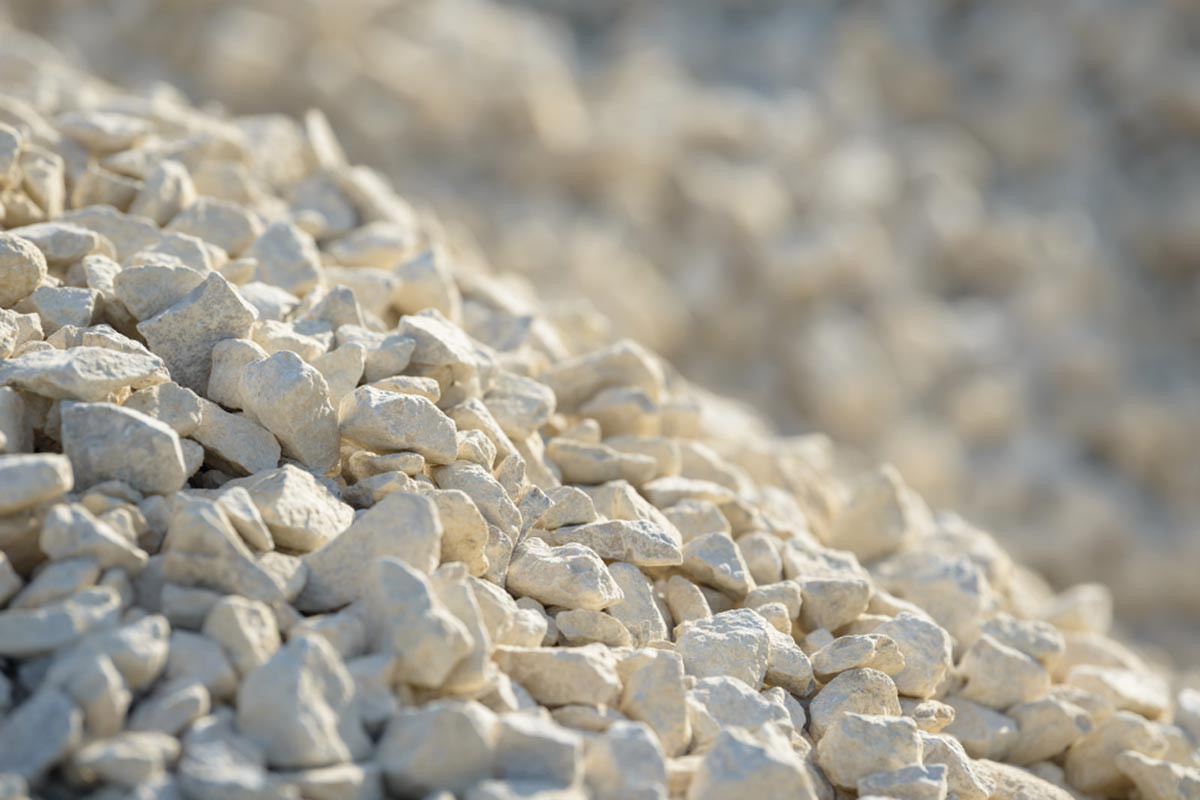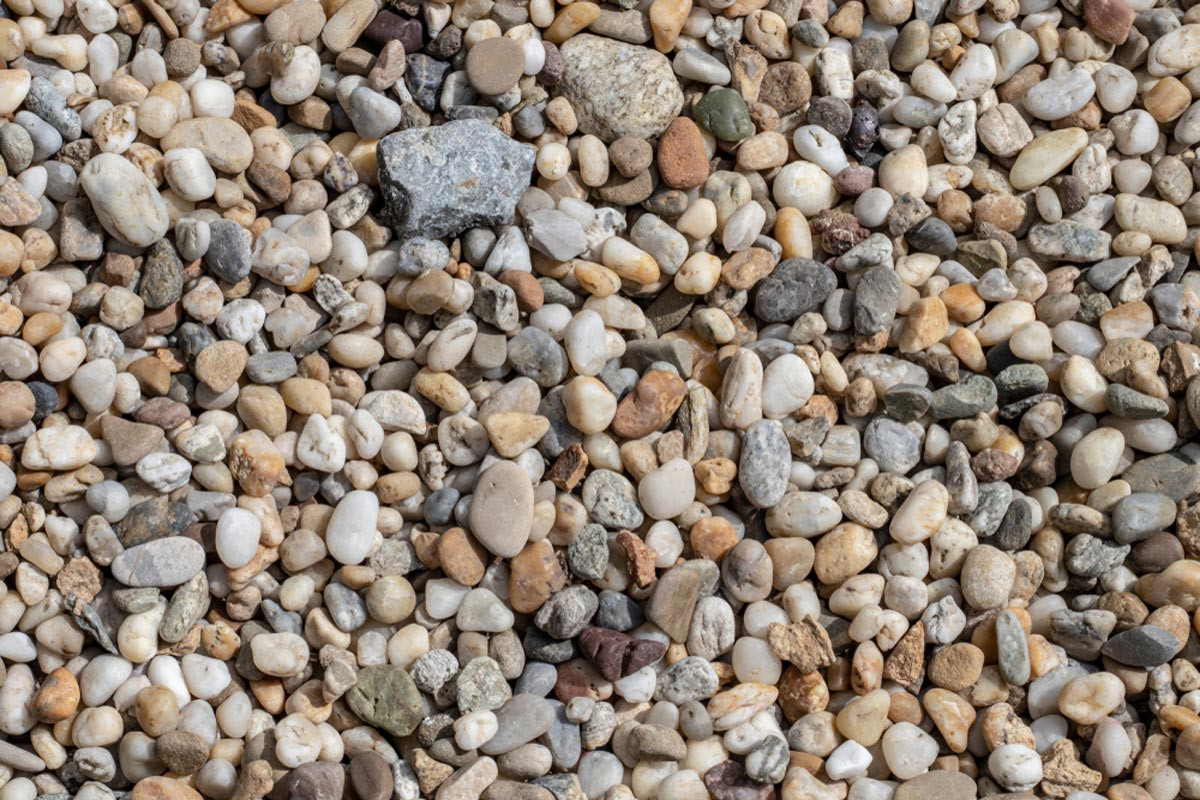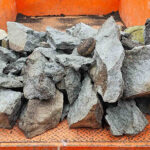Crushed rock per ton typically costs between $10 and $50. Rockscapes.net understands the importance of budgeting accurately for your landscaping and construction projects; this comprehensive guide breaks down the factors influencing crushed rock prices, helping you make informed decisions. From understanding different rock types to calculating your project needs, we provide the knowledge to enhance your space with cost-effective and beautiful stone solutions.
1. Understanding Crushed Rock Pricing: Key Factors
The price of crushed rock per ton varies depending on several key factors.
- Type of Rock: Different rock types, like limestone, granite, or gravel, have different densities and availability, affecting their cost.
- Size and Grading: The size of the crushed rock, from fine dust to larger aggregates, impacts the price due to varying processing requirements.
- Location: Quarry location and transportation costs play a significant role; the further the rock needs to be transported, the higher the price.
- Quantity: Buying in bulk (per ton) is generally cheaper than buying in smaller quantities (per bag or cubic yard).
- Market Demand: Local supply and demand can fluctuate prices.
2. Average Crushed Rock Prices Per Ton
Here’s a general overview of the average prices for crushed rock per ton:
| Type of Crushed Rock | Average Price Per Ton |
|---|---|
| Road Base | $18 – $30 |
| Limestone | $30 – $38 |
| Granite | $25 – $50 |
| Recycled Concrete | $11 – $53 |
| Pea Gravel | $28 – $45 |
| River Rock | $33 – $49 |
| Caliche Rock | $45 – $100 |
| Quartz Gravel | $69 – $95 |
| Steel Slag Rock | $25 – $39 |
These prices are approximate and can vary based on the factors mentioned above.
3. Breaking Down Crushed Rock Types and Their Costs
Let’s explore some common types of crushed rock and their typical costs per ton.
3.1. Road Base Gravel
Road base gravel, costing $18 to $30 per ton, is a mixture of crushed stones and fines, which interlock when compacted. It prevents dirt from mixing with the top layer of gravel and stops mud beds from forming in driveways.
3.2. Crushed Limestone
Crushed limestone, priced at $30 to $38 per ton, is readily available and commonly used for driveways, walkways, and as a base material. According to the National Stone, Sand & Gravel Association (NSSGA), limestone is one of the most versatile and widely used construction materials.
 Pile of crushed limestone gravel size 411
Pile of crushed limestone gravel size 411
3.3. Crushed Granite
Crushed granite, costing $25 to $50 per ton, is known for its durability and aesthetic appeal, making it suitable for landscaping and decorative purposes.
3.4. Recycled Concrete
Recycled concrete, priced at $11 to $53 per ton, is an eco-friendly option made from crushed leftover concrete and broken asphalt. It lasts as long as natural stones and offers a cost-effective alternative.
3.5. Pea Gravel
Pea gravel, costing $28 to $45 per ton, is small, smooth, and rounded, making it ideal for pathways, play areas, and decorative landscaping. It comes in various colors and is relatively inexpensive.
 Pea gravel blend with naturally smooth textures up close
Pea gravel blend with naturally smooth textures up close
3.6. River Rock
River rock, priced at $33 to $49 per ton, consists of smooth, rounded stones that are perfect for landscaping, garden beds, and drainage. They add a natural, aesthetic touch to any outdoor space.
3.7. Caliche Rock
Caliche rock, costing $45 to $100 per ton, is a sedimentary rock composed mainly of calcium carbonate. It is often used in road construction and as a base material.
3.8. Quartz Gravel
Quartz gravel, priced at $69 to $95 per ton, is valued for its sparkling appearance and durability. It is often used in decorative landscaping and pathways.
3.9. Steel Slag Rock
Steel slag rock, costing $25 to $39 per ton, is a byproduct of steel production. It is crushed and screened and is best used in drier climates for road construction and as a base material.
4. How to Estimate Crushed Rock Needs for Your Project
Calculating the amount of crushed rock needed for your project is essential for accurate budgeting. Here’s a simple formula:
- Calculate Volume: Multiply the length (in feet) by the width and then the depth (in feet) to calculate cubic feet.
- Convert to Cubic Yards: Divide the cubic feet by 27 to get cubic yards.
- Convert to Tons: Multiply the cubic yards by 1.4 to estimate tons (since one cubic yard contains approximately 1.4 tons of stone).
Formula:
- Length (ft) × Width (ft) × Depth (ft) = Cubic Feet
- Cubic Feet ÷ 27 = Cubic Yards
- Cubic Yards × 1.4 = Tons
Example:
For a 10′ x 20′ patio with a depth of 4 inches (0.33 feet):
- 10 ft × 20 ft × 0.33 ft = 66 Cubic Feet
- 66 Cubic Feet ÷ 27 = 2.44 Cubic Yards
- 2.44 Cubic Yards × 1.4 = 3.42 Tons
Therefore, you would need approximately 3.42 tons of crushed rock for this patio.
5. Cost Factors: Delivery, Installation, and Additional Expenses
Besides the price of the crushed rock itself, consider the following additional costs:
- Delivery Costs: Delivery charges range from $10 to $25 per ton, and some suppliers offer free delivery for orders over a certain amount (e.g., 5 tons).
- Installation Costs: Spreading gravel costs $10 to $25 per cubic yard or $40 to $50 per hour, depending on the job size and complexity.
- Equipment Rental: Renting a dump truck for hauling crushed stone can cost $70 to $80 per day.
- Land Preparation: Site preparation, including clearing and leveling, may incur additional costs.
6. Case Studies: Real-World Crushed Rock Project Costs
To illustrate the real-world costs of crushed rock projects, let’s examine a few case studies.
6.1. Gravel Driveway Installation
- Project: Installing a 12′ x 25′ single-car gravel driveway with a depth of 6 inches (0.5 feet).
- Material: Road base gravel at $25 per ton.
- Calculations:
- Volume: 12 ft x 25 ft x 0.5 ft = 150 Cubic Feet
- Cubic Yards: 150 Cubic Feet ÷ 27 = 5.56 Cubic Yards
- Tons: 5.56 Cubic Yards × 1.4 = 7.78 Tons
- Material Cost: 7.78 Tons × $25/Ton = $194.50
- Delivery Cost: Assuming $20 per ton delivery fee: 7.78 Tons × $20/Ton = $155.60
- Installation Cost: Assuming $45 per hour and 4 hours of labor: 4 hours × $45/hour = $180
- Total Cost: $194.50 (material) + $155.60 (delivery) + $180 (installation) = $530.10
6.2. Landscaping with Pea Gravel
- Project: Landscaping a 10′ x 20′ garden bed with pea gravel at a depth of 4 inches (0.33 feet).
- Material: Pea gravel at $35 per ton.
- Calculations:
- Volume: 10 ft x 20 ft x 0.33 ft = 66 Cubic Feet
- Cubic Yards: 66 Cubic Feet ÷ 27 = 2.44 Cubic Yards
- Tons: 2.44 Cubic Yards × 1.4 = 3.42 Tons
- Material Cost: 3.42 Tons × $35/Ton = $119.70
- Delivery Cost: Assuming $15 per ton delivery fee: 3.42 Tons × $15/Ton = $51.30
- Installation Cost: Assuming $40 per hour and 2 hours of labor: 2 hours × $40/hour = $80
- Total Cost: $119.70 (material) + $51.30 (delivery) + $80 (installation) = $251.00
6.3. Walkway with Crushed Limestone
- Project: Creating a 4′ x 20′ walkway with crushed limestone at a depth of 4 inches (0.33 feet).
- Material: Crushed limestone at $32 per ton.
- Calculations:
- Volume: 4 ft x 20 ft x 0.33 ft = 26.4 Cubic Feet
- Cubic Yards: 26.4 Cubic Feet ÷ 27 = 0.98 Cubic Yards
- Tons: 0.98 Cubic Yards × 1.4 = 1.37 Tons
- Material Cost: 1.37 Tons × $32/Ton = $43.84
- Delivery Cost: Assuming $22 per ton delivery fee: 1.37 Tons × $22/Ton = $30.14
- Installation Cost: Assuming $42 per hour and 3 hours of labor: 3 hours × $42/hour = $126
- Total Cost: $43.84 (material) + $30.14 (delivery) + $126 (installation) = $199.98
These case studies provide a clearer picture of the potential costs involved in different types of projects using crushed rock.
7. Tips for Saving Money on Crushed Rock
Here are some practical tips to help you save money on crushed rock:
- Buy in Bulk: Purchasing crushed rock in larger quantities (per ton) is typically cheaper than buying smaller amounts.
- Source Locally: Obtain crushed rock from local quarries to reduce transportation costs.
- Compare Prices: Get quotes from multiple suppliers to ensure you’re getting the best deal.
- Consider Recycled Materials: Recycled concrete or asphalt can be more cost-effective than virgin materials.
- Plan Ahead: Accurate measurements and planning can prevent over-ordering, saving you money on excess materials.
- DIY Installation: If your project is small and straightforward, consider installing the crushed rock yourself to save on labor costs.
8. Environmental Considerations and Sustainability
When choosing crushed rock, it’s essential to consider the environmental impact. Opting for recycled materials, such as crushed concrete or recycled asphalt, can significantly reduce your project’s carbon footprint. Additionally, sourcing materials locally reduces transportation emissions. Always ensure that the supplier follows environmentally responsible practices in their quarrying and processing operations.
9. Maintaining Your Crushed Rock Surfaces
Proper maintenance can extend the life of your crushed rock surfaces and keep them looking their best.
- Regular Raking: Rake gravel driveways and pathways regularly to keep them level and prevent weed growth.
- Weed Control: Apply a pre-emergent herbicide to prevent weed growth, or manually remove weeds as they appear.
- Top-Up Material: Over time, crushed rock may settle or erode. Add a fresh layer of material to maintain the desired depth and appearance.
- Proper Drainage: Ensure adequate drainage to prevent water accumulation, which can lead to erosion and instability.
10. FAQ: Common Questions About Crushed Rock Prices
10.1. How Much Does a Ton of Crushed Rock Cover?
A ton of crushed rock covers approximately 40 to 50 square feet at a depth of 4 inches. This coverage varies depending on the size and type of rock.
10.2. What is the Cheapest Type of Crushed Rock?
Recycled concrete and crushed asphalt are generally the cheapest types of crushed rock, often costing between $10 and $27 per ton.
10.3. How Many Tons of Gravel Do I Need for a Driveway?
The amount of gravel needed for a driveway depends on its size and depth. For example, a 12′ x 25′ driveway with a depth of 6 inches requires approximately 7.78 tons of gravel.
10.4. Can I Pick Up Crushed Rock Myself to Save on Delivery Costs?
Yes, many quarries and suppliers allow customers to pick up crushed rock themselves. Renting a truck for a day might be more cost-effective than paying for delivery, especially for smaller quantities.
10.5. What is the Difference Between Crushed Stone and Gravel?
Crushed stone is produced by mechanically crushing larger rocks, while gravel is naturally weathered rock. Crushed stone tends to have sharper edges, while gravel is smoother and more rounded.
10.6. How Do I Calculate the Right Depth of Crushed Rock for My Project?
The appropriate depth depends on the application. For walkways, 4 inches is typically sufficient. Driveways may require 6 to 8 inches for stability.
10.7. Is it Better to Buy Crushed Rock by the Ton or by the Cubic Yard?
Buying by the ton is generally more accurate, as it accounts for the weight of the material. However, buying by the cubic yard is also common, and the conversion factor is approximately 1.4 tons per cubic yard.
10.8. What Factors Affect the Lifespan of a Crushed Rock Driveway?
The lifespan of a crushed rock driveway depends on factors such as the quality of the material, the level of traffic, the effectiveness of drainage, and regular maintenance.
10.9. How Can I Prevent Weeds From Growing in My Crushed Rock?
Using a landscape fabric underneath the crushed rock and applying a pre-emergent herbicide can effectively prevent weed growth.
10.10. Are There Specific Types of Crushed Rock That are Better Suited for Certain Climates?
Yes, certain types of crushed rock are better suited for different climates. For example, steel slag is best used in drier climates, while expanded shale is ideal for clay-based soils and areas prone to flash flooding.
Conclusion: Making Informed Crushed Rock Purchases
Understanding the costs associated with crushed rock is essential for successful landscaping and construction projects. By considering the type of rock, quantity, delivery fees, and installation costs, you can accurately budget and make informed decisions. Rockscapes.net is here to help you navigate these choices, providing expert advice and quality materials to enhance your outdoor spaces.
Ready to get started on your next project? Explore our extensive selection of crushed rock and landscape materials at Rockscapes.net. Contact us today for a personalized consultation and discover how we can help you bring your vision to life! Visit us at 1151 S Forest Ave, Tempe, AZ 85281, United States, call us at +1 (480) 965-9011, or visit our website at Rockscapes.net. Let rockscapes.net be your partner in creating stunning and sustainable landscapes!
